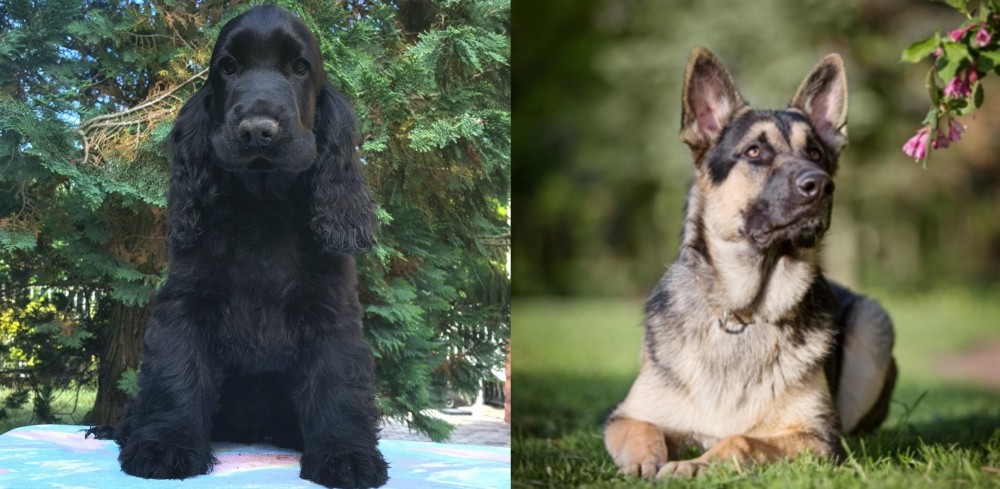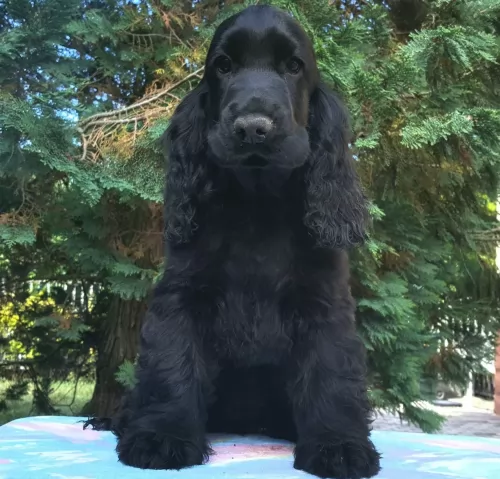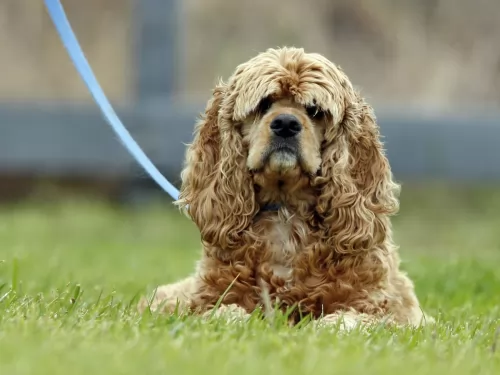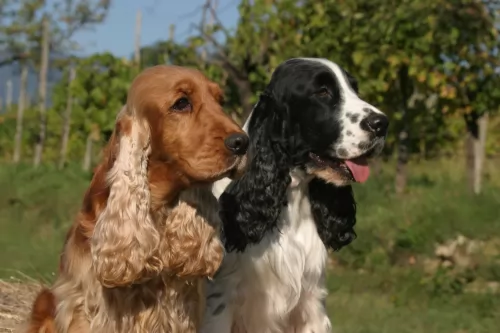 Petzlover
Petzlover American Cocker Spaniel is originated from United States but East European Shepherd is originated from Russia. American Cocker Spaniel may grow 36 cm / 14 inches shorter than East European Shepherd. American Cocker Spaniel may weigh 36 kg / 79 pounds lesser than East European Shepherd. American Cocker Spaniel may live 3 years more than East European Shepherd. American Cocker Spaniel may have less litter size than East European Shepherd. Both American Cocker Spaniel and East European Shepherd requires Moderate Maintenance.
American Cocker Spaniel is originated from United States but East European Shepherd is originated from Russia. American Cocker Spaniel may grow 36 cm / 14 inches shorter than East European Shepherd. American Cocker Spaniel may weigh 36 kg / 79 pounds lesser than East European Shepherd. American Cocker Spaniel may live 3 years more than East European Shepherd. American Cocker Spaniel may have less litter size than East European Shepherd. Both American Cocker Spaniel and East European Shepherd requires Moderate Maintenance.
 Descended from the English Cocker Spaniel when the latter were brought to the United States in the late 1800s. American hunters wanted a smaller dog for bird hunting, so they crossed them with smaller spaniel breeds. The English and the American Cockers were considered the same breed until 1935 when the American Kennel Club officially separated them into 2 distinct breeds. After this the American Cocker’s popularity increased dramatically.
To this day they are one of the most popular breeds in the U.S. Recently their popularity has spread back to England. The American Cocker Spaniel has evolved from a hunting dog life to a very popular family pet.
Descended from the English Cocker Spaniel when the latter were brought to the United States in the late 1800s. American hunters wanted a smaller dog for bird hunting, so they crossed them with smaller spaniel breeds. The English and the American Cockers were considered the same breed until 1935 when the American Kennel Club officially separated them into 2 distinct breeds. After this the American Cocker’s popularity increased dramatically.
To this day they are one of the most popular breeds in the U.S. Recently their popularity has spread back to England. The American Cocker Spaniel has evolved from a hunting dog life to a very popular family pet.
 The East European Shepherd is a dog which hails from Russia. The dog was developed in the 1930-1950s as there was a need for a bigger, more robust, weather-resistant type of dog who would perform all kinds of guard duties in the Soviet Union.
The East European Shepherd is a dog which hails from Russia. The dog was developed in the 1930-1950s as there was a need for a bigger, more robust, weather-resistant type of dog who would perform all kinds of guard duties in the Soviet Union.
This is a rare dog breed, created by mixing Russian breeds such as the Laika, Central Asian Shepherd and Caucasian Shepherd to create a strong working dog that could cope well with the sub-freezing conditions.
The standard breed type was established in 1964. The only major kennel club to grant full recognition to the East-European Shepherd is the Russian Kennel Club. In the United States, the dog is recognized by a number of rare breed registries.
 The American Cocker spaniel is a sturdy dog of medium size. The have a rounded head with a broad and deep muzzle. The jaw is even and square while the teeth have a scissors bite. The American Cocker has round eyes that are almost always dark with the exception of the Merle who can have blue colored eyes. They have long ears and a docked tail in the U.S. Docking is illegal in most of Europe. The American Cocker bred for field hunts have shorter coats than those bred for show. Grooming is essential for this longhaired breed. It is especially important for the eyes and ears to be kept clean.
The American Cocker spaniel is a sturdy dog of medium size. The have a rounded head with a broad and deep muzzle. The jaw is even and square while the teeth have a scissors bite. The American Cocker has round eyes that are almost always dark with the exception of the Merle who can have blue colored eyes. They have long ears and a docked tail in the U.S. Docking is illegal in most of Europe. The American Cocker bred for field hunts have shorter coats than those bred for show. Grooming is essential for this longhaired breed. It is especially important for the eyes and ears to be kept clean.
 The East European Shepherd is larger than a German Shepherd. He is described as a large dog with males and females standing roughly at 66-76 centimeters at the withers and weighing anything between 30–50kg.
The East European Shepherd is larger than a German Shepherd. He is described as a large dog with males and females standing roughly at 66-76 centimeters at the withers and weighing anything between 30–50kg.
The coat with undercoat is medium in length with the standard color being black-and-tan or black-and-red. The dog is solid colored or is light fawn or tan in color with black saddle.
The face of the dog is black and he looks a lot like a wolf in appearance. The ears of the East European Shepherd are medium sized and always erect.The tail is long and hangs low.
The East European Shepherd is an intelligent and confident dog and can be aggressive when aggravated. He is a working dog and to get along with other pets in the home as well as children, the East European Shepherd will need to be trained and socialized, becoming obedient and loyal with his owner.
He is an intelligent dog and training him poses no problem. Loyal and devoted, this dog mostly becomes particularly attached to one member of the family.
There are a number of dog experts who don’t recommend the dog as a family pet as it is a dog reluctant to form a close bond with a child, being irritated by them, especially ill disciplined children.
It is a strong-willed dog too and shouldn’t be the first dog choice for a novice dog owner. They make excellent guard dogs and take their role as protector of the family seriously.
 This is a gentle, happy dog. They are high energy, high spirited, friendly dogs who like people and other animals alike. They are happy to be with you and want to please you. He can find a home in the country and in the city alike. He is inquisitive and easy to train.
This is a gentle, happy dog. They are high energy, high spirited, friendly dogs who like people and other animals alike. They are happy to be with you and want to please you. He can find a home in the country and in the city alike. He is inquisitive and easy to train.
But be warned they can be stubborn and hard to housebreak. They can be shy and need a lot of socialization as a pup. They can take over a household if you are not the strong pack leader they need. They have a tendency to urinate when excited and must live inside with the family. They are far too social to be left outside. An unhappy, unstable cocker can be into resource guarding of things, spaces and people. They can bark obsessively or be hyperactive. They must have a loving home with the family.
 The East-European Shepherd dogs are balanced, confident, intelligent, loving and playful while also being tough and protective of their owners.
The East-European Shepherd dogs are balanced, confident, intelligent, loving and playful while also being tough and protective of their owners.
They make fantastic guard dogs, becoming aggressive around strangers whom they don’t trust. When you bring a dog like this into the home, it is essential to have him trained and socialized and to also have a firm owner who can deal with such a strong-willed animal.
He is an active, alert dog who will require regular exercise and will slot into life in the city or in the country so long as his exercise needs are met.
When you look after your East European Shepherd you’ll find in him a devoted, loyal friend who will protect you with his life.
 Perhaps the least of the American Cocker Spaniel’s health concerns are the tendency to overeat and become obese. The more serious concerns include glaucoma, cataracts, dysplasia, allergies, Cherry eye, lip fold pyoderma, liver disease, cardiomyopathy, and congestive heart failure (CHF).
Perhaps the least of the American Cocker Spaniel’s health concerns are the tendency to overeat and become obese. The more serious concerns include glaucoma, cataracts, dysplasia, allergies, Cherry eye, lip fold pyoderma, liver disease, cardiomyopathy, and congestive heart failure (CHF).
The most serious health issue the breed faces is IMHA or Immune Mediated Hemolytic Anemia which can be deadly. In fact, it is almost always fatal and comes on quickly. With this condition the dog can bleed out internally and there is little that veterinary medicine can do.
 Regarded as a tough dog who can reach 10 – 12 years of age, the East European Shepherd is prone to hip or elbow dysplasia. This is a a disease that is more prevalent with German Shepherd type dogs.
Regarded as a tough dog who can reach 10 – 12 years of age, the East European Shepherd is prone to hip or elbow dysplasia. This is a a disease that is more prevalent with German Shepherd type dogs.
Dysplasia is a genetic condition which can lead to inflammation and arthritis and even lameness. Unfortunately it can happen with young dogs too, and the vet will suggest different types of treatment which can include surgery.
Degenerative myelopathy is another degenerative disease which can be found with the East European Shepherd. It is a fatal, progressive degenerative disease of the spinal cord. Unfortunately there isn’t treatment for the disease, leading to paralysis of the limbs.
 The American Cocker Spaniel breed requires attention to detail and making sure your puppy gets enough and your adult doesn’t get too much. Feed the pups twice a day until they reach the age of 4 months and then cut them back to the adult dose of once a day at supper time. Feed from a cup to a cup and a half.
The American Cocker Spaniel breed requires attention to detail and making sure your puppy gets enough and your adult doesn’t get too much. Feed the pups twice a day until they reach the age of 4 months and then cut them back to the adult dose of once a day at supper time. Feed from a cup to a cup and a half.
not previously mentioned include Ectropion and Entropion, Prolapse of the nicititans gland, gastric torsion and elbow dysplasia. Have your puppy tested for eye diseases and any issues with the knee and hip. These are social dogs and will not do well alone outside. They need to live inside.
The American Cockers love to play and need a lot of exercise. Nice long walks, games of fetch or even agility will keep your Cocker happy. have plenty of stamina and need regular exercise. They also enjoy a good hunt.
 The coat of the East European Shepherd is thick, and while he won’t require any professional grooming, he will require being brushed at least twice a week. This is because he sheds heavily at certain times.
The coat of the East European Shepherd is thick, and while he won’t require any professional grooming, he will require being brushed at least twice a week. This is because he sheds heavily at certain times.
His nails will need to be clipped if they don’t wear down naturally, and his teeth will require regular brushing at least 2 or 3 times a week. Fortunately, because his ears are large and open, he doesn’t easily get an ear infection.
The East European Shepherd is a dog which has always been worked. It is a highly energetic dog and its role as a guard- and herding dog has made it that the dog will require a good dose of exercise.
A long walk may not be enough for this active dog, and he will require intense ball throwing with a tennis racquet to get the ball far away so that he can run far to fetch the ball. Without enough exercise, the East-European Shepherd will develop behavioral problems which will include aggression.